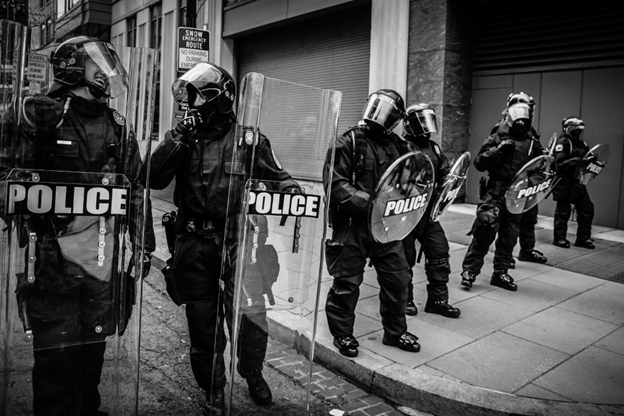Police Turnover Rates: A Comprehensive Guide (2025)
Police turnover rates are rising, leaving departments short-staffed. Learn why officers are leaving and how to improve retention in your agency.

Is your office collecting more resignation letters faster than you can post job openings? You’re not imagining it—police turnover rates are skyrocketing, and your department is feeling the strain.
Veteran officers are retiring early. New recruits barely last five years. Meanwhile, your remaining team is overworked, under-supported, and stretched thin. Overtime is up, morale is down, and public safety is at risk.
If you’re tired of watching good officers walk away, you need to understand why they’re leaving—and what you can do to stop it. Let’s break down the numbers, the causes, and the real solutions that can help you keep your officers on the job.
What Is Police Turnover?
Police turnover refers to the rate at which officers leave a law enforcement agency voluntarily or involuntarily. This includes resignations, retirements, terminations, and transfers to other departments.
A high police turnover rate strains resources, reduces public trust, and increases crime rates due to understaffing.
Police Turnover Rate Statistics & Trends
Law enforcement agencies across the U.S. have been experiencing record-high police turnover rates in recent years. Here are some key statistics:
- A 2023 study found that police resignations increased by 47% from 2019 to 2022.
- Retirements also rose by 19% in the same period, adding to the pressure on agencies already struggling with recruitment.
- New officer hiring dropped by 5%, making it harder to replace those who leave.
- Large urban departments have been hit the hardest, with some seeing over 30% of officers leaving within their first five years.
5 Common Causes of Police Turnover

Officers don’t walk away from their careers without a reason. Retention struggles stem from a mix of workplace conditions, societal factors, and personal decisions. Understanding why officers leave is the first step toward fixing the problem.
#1. Low Morale and Job Dissatisfaction
Policing has always been demanding, but morale is at an all-time low. Officers report feeling unsupported by leadership, undervalued by their communities, and overburdened by department policies. 56% of officers considering leaving cited low morale as a primary factor.
#2. Increased Stress and Burnout
The job has always been stressful, but workload increases and constant crisis response are pushing officers past their limits. With fewer officers on staff, those who remain work longer shifts, respond to more calls and deal with rising violent crime rates.
#3. Better Pay and Benefits Elsewhere
Many officers aren’t leaving law enforcement entirely—they’re moving to departments or private-sector jobs with better pay, benefits, and working conditions.
- Some smaller departments struggle to compete with the salaries and benefits offered by larger agencies.
- Others leave for private security roles, which often provide similar compensation without the dangers of police work.
- In some cases, officers transfer to departments in different cities or states where they feel more supported.
#4. Public Perception and Media Scrutiny
In recent years, policing has come under intense public and media scrutiny. Officers feel like they’re constantly under a microscope, with every decision second-guessed.
High-profile incidents and policy changes have led some officers to feel that the risk of doing the job outweighs the reward. Departments that fail to support their officers through these challenges often see higher resignation rates.
#5. Retirement Eligibility
While retirements are expected, many officers are choosing to leave as soon as they’re eligible rather than staying longer. The combination of stress, workload, and department policies has led some officers to take their pensions early rather than tough it out for a few more years.
Police Resignations vs. Retirements
Not all departures are the same. Understanding why officers leave will help you build strategies to keep them on the force.
- Resignations: Officers leave before retirement age, often due to burnout, stress, lack of department support, or better-paying opportunities elsewhere.
- Retirements: Officers complete their years of service and exit after reaching pension eligibility. These departures are predictable and expected.
Why It Matters: You can plan for retirement, but resignations come out of left field. Losing trained officers unexpectedly means more overtime, heavier caseloads, and longer response times—putting even more strain on those who stay.
Where Police Turnover Stands in 2025
Recent data reveals that a significant number of officers are searching for a way out—and fast. Many officers are retiring earlier than expected, citing stress, department policies, and lack of support as reasons for leaving before their full pension eligibility
Voluntary Resignations
In recent years, law enforcement agencies have experienced a notable increase in voluntary resignations.
Resignations among sworn officers increased by 2.5% from 2019 to 2020, then surged by almost 40% in 2021 and another 14% in 2022. Although there was a 21.6% decrease in resignations in 2023, the number of resignations in 2023 was still 28.6% higher than in 2019.
Retirement Rates
Retirement rates have also fluctuated, impacting workforce demographics within law enforcement.
The same PERF report indicates that sworn officer retirements increased by almost 30% from 2019 to 2020, decreased by more than 5% in 2021, increased again by almost 8% in 2022, and decreased by almost 24% in 2023. Overall, agencies had roughly 1% more retirements in 2023 than in 2019.
Case Study: Pittsburgh Police Department
The Pittsburgh Police Department exemplifies these trends. Over the past decade, the average combined number of retirements and resignations was approximately 64 per year. However, in 2023, 101 officers retired or resigned, and in 2024, that number rose to 105.
Police Turnover Impacts Law Enforcement Agencies

High police turnover rates create long-term challenges for the entire department and the communities they serve. When experienced officers walk away, agencies are left scrambling to fill gaps, train new hires, and maintain public trust.
● Loss of Experienced Personnel
Every officer who leaves takes years of training, institutional knowledge, and field experience with them. Veteran officers play a critical role in:
- Mentoring younger recruits and passing down essential policing skills.
- Handling complex cases that require judgment and experience.
- Building community relationships that take years to develop.
● Increased Training Costs
Replacing an officer means investing in months of training and field experience. On average, it costs departments between $100,000 and $200,000 to recruit, train, and equip a single new officer.
The problem? Many officers resign within their first five years. Agencies end up in a cycle of:
- Spending thousands to train recruits.
- Watching them leave for other departments or careers.
- Starting the process over again.
● Public Safety
When departments are short-staffed, response times increase, investigative backlogs grow, and proactive policing efforts suffer. In cities facing high turnover rates:
- Fewer officers are available to respond to emergency calls.
- Crime rates rise due to a lack of officer presence.
- Overworked officers make more mistakes, leading to liability issues and lower public trust.
8 Ways to Effectively Combat Police Turnover

Retaining officers means making sure they want to stay with your department. Departments that invest in officer well-being streamline workloads, and create career growth opportunities see better retention rates. Here’s what actually works.
#1. Prioritize Mental Health Support
Policing is one of the most stressful professions, and officers often don’t get the mental health support they need. Ignoring stress and trauma leads to burnout, early retirements, and resignations.
What works:
- Peer support programs where officers can talk with colleagues who understand the job.
- Confidential mental health counseling with therapists who specialize in law enforcement trauma.
- Mandatory mental health check-ins to reduce stigma and ensure officers get help before burnout sets in.
#2. Use Enterprise Transcription to Reduce Administrative Burden
Paperwork is a time-consuming frustration for many officers. After long shifts, spending hours writing reports adds to stress and fatigue. Enterprise transcription services allow officers to dictate reports on the go, cutting down administrative time and keeping them focused on the job.
Why it helps:
- Faster report completion—officers can dictate reports instead of typing them.
- Less overtime—reduces the need to stay late filling out paperwork.
- More time in the field—officers can focus on proactive policing instead of being buried in paperwork.
#3. Invest in Law Enforcement Transcription Services
Some departments rely on generic transcription software, but policing requires accuracy and security. Law enforcement transcription services provide:
- 100% human transcription for better accuracy (no AI errors).
- Fast turnaround times so reports are completed quickly.
- CJIS-compliant security to protect sensitive information.
#4. Automate Routine Processes
Beyond transcription, automating routine law enforcement tasks helps reduce workload and increase efficiency. Some ways departments can do this include:
- Automated scheduling software to eliminate confusion over shifts and reduce burnout.
- Digital evidence management systems to organize and retrieve files quickly.
- Automated case management to track reports, investigations, and paperwork in one place.
#5. Improve Pay and Benefits
Officers leave for better pay, better benefits, and better working conditions. Agencies that want to keep officers need to offer:
- Competitive salaries that reflect the risks and responsibilities of the job.
- Retention bonuses to reward officers who stay.
- Better benefits packages—including mental health care, tuition reimbursement, and career training.
#6. Strengthen Leadership and Department Support
Officers don’t just leave because of stress—they leave because of poor leadership. A department culture that prioritizes support, recognition, and officer well-being makes a difference.
What helps:
- Recognizing good work—publicly acknowledging officers for their service.
- Providing career advancement opportunities—offering leadership training and specialized roles.
- Encouraging open communication—officers should feel comfortable giving feedback without fear of retaliation.
#7. Offer Alternative Career Paths Within the Department
Not every officer wants to spend their entire career on patrol. Giving officers internal career options helps them stay in law enforcement instead of leaving for other careers.
Options include:
- Detective or investigative roles
- Specialized units (SWAT, K9, cybercrime, community policing, etc.)
- Training and instructor positions
- Administrative leadership roles
#8. Build a Culture of Support and Retention
At the end of the day, officers stay where they feel valued, supported, and heard. A department that prioritizes officer well-being, reduces unnecessary stress, and offers career growth will have lower turnover rates and higher job satisfaction.
How SpeakWrite Helps Alleviate Police Turnover

One of the biggest contributors to police burnout and turnover is the overwhelming administrative workload. Paperwork takes officers off the streets, increases overtime, and adds to daily stress.
SpeakWrite’s human-powered transcription services help departments cut down on tedious documentation, giving officers more time to focus on policing.
Faster Report Completion
With SpeakWrite, officers can dictate reports from anywhere, whether they’re in their patrol car or at the station. Instead of spending hours typing case notes, incident reports, or witness statements, officers submit their recordings and receive a fully transcribed document in about three hours.
Less Overtime and Administrative Burden
When officers aren’t stuck at a desk after their shift finishing reports, overtime costs go down, and work-life balance improves. This reduces burnout and makes the job more sustainable in the long term.
CJIS-Compliant Security for Law Enforcement
SpeakWrite’s law enforcement transcription services meet CJIS security standards, ensuring sensitive information is handled securely and accurately. This eliminates the risks that come with AI-generated reports and unreliable speech-to-text software.
Improving Officer Retention Through Efficiency
By reducing administrative stress and unnecessary paperwork, SpeakWrite helps law enforcement agencies keep experienced officers on the job longer. When officers can spend more time in the field and less time behind a computer, job satisfaction improves—leading to better retention and a more effective police force.
Getting Started with SpeakWrite Is Simple
Ready to reduce admin overload? Get started with SpeakWrite today.
Step 1. Record Your Report
Use your phone, computer, or SpeakWrite’s dictation line to record your incident reports, case notes, or statements—anytime, anywhere.
Step 2. Submit Your File
Upload your recording through the SpeakWrite app or web portal. Your audio is instantly sent to CJIS-compliant human transcriptionists for secure, accurate processing.
Step 3. Get Your Transcription Fast
In about three hours, your fully formatted report is ready to download and submit—no typing, no delays, no stress.
Police Turnover Rates: Frequently Asked Questions
Does law enforcement have a high turnover rate?
Yes, law enforcement has a high turnover rate, with resignations increasing 47% from 2019 to 2022 and retirements rising 19% in the same period. Many officers leave due to burnout, low morale, and better job opportunities elsewhere.
How many police officers quit?
Police resignations have surged in recent years. In 2023 alone, resignations were 28.6% higher than in 2019. Some cities, like Seattle, saw a 72% increase in officer resignations.
What is the rule of 60 police staffing?
The Rule of 60 suggests that a fully staffed police department should have at least 60 officers per 100,000 residents. However, due to high turnover rates, retirements, and recruitment struggles, many agencies fall below this benchmark, leading to longer response times and increased workloads for remaining officers.
Is a police officer the most stressful job?
Yes, policing is consistently ranked as one of the most stressful jobs due to long hours, exposure to violence, high public scrutiny, and life-threatening situations. Studies show that officers experience higher rates of PTSD, depression, and anxiety compared to other professions, contributing to high turnover and early retirements.
Remove the Desk Handcuffs and Get Your Officers Back to Helping People
Every hour spent buried in paperwork is an hour stolen from the job they were trained to do. Stop the burnout, cut the admin overload, and keep your force focused on what matters.
Work with SpeakWrite to streamline reporting and keep your officers where they belong—on the streets, not behind a desk.
